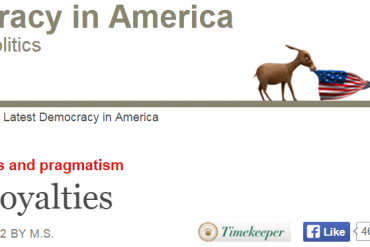Facebook is an interesting window into what people in your extended community think about – what occupies their time – what moves them culturally socially and politically. A few status updates, or the posting of a link or video, can tell you who’s a Yankees fan and who roots for the Red Sox; who grooves to Madonna and who prefers Brahms; who likes hanging out at the trendy downtown club and who feels more at ease at the neighborhood dive bar; whose sister just had a baby, and who recently returned from vacation.
Someone as political as me, however, is constantly looking for signs of friends’ political leanings. Do they identify with a political party/ideology/movement on their Info page? Do they subscribe to fan pages for politicians of certain political persuasions? Did their posts reflect support for Obama or McCain during the recent election? Do they show their support or disapproval Obama’s healthcare reform proposals? Do they post patriotic messages on July Fourth? Are reproductive rights important to them, or environmentalism? And, who inspires them to anger – evangelical conservatives or secular liberals?
While I post many non-political updates, am fond of commenting on pop cultural or sports, sometimes post the latest pic of my little nephew, and will post the simply humorous, the pithy one-liners, and the ”just because” updates like most people, my greatest political passion involves Israel and, as such, Facebook for me is an incredible opportunity to use the new social networking media as an extension of my Zionist activism. From linking to my latest blog posts, to posting links to polemics I find persuasive, or more creative/personal essays I find moving or evocative, Facebook is a great way to spread the ”word” about Israel and to rebut the dangerous rhetoric of Israel’s critics.
Recently, I posted a link to Iranian President Mahmoud Ahmadinejad’s latest speech in which he once again called for the elimination of Israel and denied the Holocaust. I later posted a link to Israeli Prime Minister Netanyahu’s speech at the UN, where he eloquently criticized those in attendance at Ahmadinejad’s speech who actually applauded at its conclusion. I also, posted a link to a translation of a Hamas children’s show in which the main character, a bear named Nassur, informs the children that it is their duty to slaughter all of the Jews.
Among many of my progressive Jewish friends on Facebook, however, religious and non-religious, even those whose support for Israel has been demonstrated by frequent visits to the Jewish state, there is (with some notable exceptions) not much political content about Israel on their updates, nor are there comments (or the Facebook ”thumbs-up) to Israel-related posts by Zionist activists within their network. And, to the degree that these at least marginally socially aware friends do post political content, the issues which they seem most comfortable highlighting their support for tends to be healthcare, environmentalism, poverty, homelessness – lending their support for ”social justice” related concerns, consistent with how they view a commitment to ”Tikkun Olam” (repairing the world).
While many of these causes are indeed admirable, there is a ferocity in their support for these causes which seems, anyway, strangely absent in their support for Israel. For instance, the anger among my progressivefriends with Republican opposition to President Obama’s healthcare proposals was palpable in a supportive post which people were being asked to use as their status update, which read:
”No one should die because they cannot afford health care, and no one should go broke because they get sick.”
If you agree, please post this as your status update for the rest of your day’
While I’m not certain if this status update exactly went viral, many of my friends responded in kind to this request, and posted this sentiment, which was then seen by their network of friends, etc. While my thoughts on Obamas’s health care plan are a bit complicated, I do admire the passion many have for this topic, and – while I wish there was a bit more tolerance for those of us who had at least some reservations about increased government involvement in the health care sector of the U.S. – I am, more broadly, heartened whenever I see people engaged in a cause greater than their own self-interest. However, it seems that the only ones who ever post on Israel are (again, with a couple notable exceptions) those on the political right – broadly defined. While using my admittedly limited social network on Facebook (500 friends) to assess a community’s passion for a given cause is, I readily acknowledge, not the most rigorous method for determining such a complex phenomena, there are polls and more empirically driven data which seem to indicate at least prima facie evidence in favor of my conclusions.
While the politics of progressive support for Israel, and their views of Israeli-Palestinian Conflict, more broadly, is a very complicated topic – and, I have at least begun to address the issue in two essays I wrote which were published by the Jewish Exponent right before I made Aliyah, here – the seeming ambivalence many on the Left feel when confronted with the topic of Israel concerns me greatly, and may lead to some very uncomfortable conclusions about the nature of modern progressive thought and the future of Jewish support for the democratic Jewish state.
A Jewish writer, Jay Michaelson, recently wrote an essay which appeared in The Forward expressing his diminishing ”love” for Israel, and his increasing reluctance to mount a defense against her critics. And, while this, in itself, is, sadly, not a totally unique sentiment for a progressive Jew to express, at least one of the reasons he provides does seem unusual, as he openly laments that defending Israel within his progressive social circles (not to mention on college campuses, European liberal political circles) is an extremely risky endeavor. He says,
”In my social circles, supporting Israel is like supporting segregation, apartheid…the war in Iraq, or George Bush …It’s gotten so bad, I don’t mention Israel in certain conversations anymore, and no longer defend it when it’s lumped in with South Africa and China by my friends.”
Yet, he goes on to admit that he knows it is,
”…a sign of weakness of will on my part…this is wrong of me, I know.”
He, remarkably, concludes by acknowledging:
”I still support the State of Israel, its right to exist and the rest. Most important, it is still, in part, my home…. But as an outsider, I no longer want to feel entangled by their decisions and implicated in their consequences.B’seder: It’s your choice to make… but count me out”.
Michaelson’s acknowledgment that, though he still supports Israel and believes the arguments against it are often weak and quite facile, he is simply unwilling to burden the social consequences of that support is remarkable in its honesty, but depressing in its lack of resolve – and expresses a politics which writer Anthony Julius aptly referred to, in his powerful essay on Jewish anti-Zionism, in the American Jewish Committee website, Z-Word, as the ”morality of vanity”. Anthony states:
”The moralizer makes judgments on others and profits by so doing. He puts himself on the right side of the political fence.”
While I wish to be clear that I’m not accusing all, or even most, progressive Jews who don’t feel comfortable expressing public support for Israel of such vanity, and I am fully aware that there are Jews who don’t support Israel for what I feel are misguided, but principled reasons – I am asking to what degree the fact that identifying too closely with Israel has become unfashionable (indeed, a social liability) plays a part in many Jews’ unwillingness to openly show their solidarity for the state – a nation which has historically served as the only true political refuge for Jews all over the world, as well as the religious and spiritual home for Jewish culture, the Hebrew language, and Jewish religious life, as well as a politically liberal state, one which is fully consistent with our progressive ideals.
Let me further suggest that progressive politics, the way the word is typically understood in most Jewish circles, has largely come to mean the identification with the oppressed, those fighting for freedom against tremendous odds, as well as the urge to provide ”comfort to the afflicted and afflict the comfortable.” And, as such, it should be remembered that Israel is still – despite its incredible economic and social achievements over the last 62 years – in many ways also a beleaguered state, the David fighting Goliath, a state surrounded by enemies who openly and repeatedly call for her physical destruction, and one who is also forced to confront a furious intellectual assault – those who use the media and international bodies to weaken Israel morally and politically. There is nothing even remotely right-wing (or ”reactionary”) – in what these terms have come to broadly denote in our current political context – about Zionism.
So, allow me to conclude by saying that if being a progressive in good standing requires you to abstain from expressing your solidarity with the state of the Jewish people then you may wish to reconsider your political alliances, and start to ask the question, ”where have my progressive anti-Israel friends gone wrong?”
With 192 nations in the world, all representing various ethnic, religious, or social affinities, Israel – the only homeland representing the religious, political, and cultural aspirations of the Jewish people – should never have its right to exist as a state for the Jewish people questioned, nor should her passionate supporters be excluded from the progressive community.
Post this as your status update for the rest of your day




